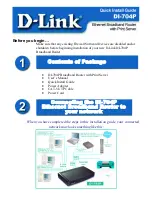
NI WSN-3226 User Guide and Specifications
32
ni.com
Shock and Vibration
Operating vibration, random (IEC 60068-2-64) ....5 g
rms
, 10 to 500 Hz
Operating shock (IEC 60068-2-27) .......................30 g, 11 ms half sine,
50 g, 3 ms half sine,
18 shocks at 6 orientations
Operating vibration,
sinusoidal (IEC 60068-2-6) ...................................5 g, 10 to 500 Hz
Electromagnetic Compatibility
Caution
Electromagnetic interference can adversely affect the measurement accuracy of this
product. The input/output terminals of this device are not protected for electromagnetic interference.
As a result, this device may experience reduced measurement accuracy or other temporary
performance degradation when connected cables are routed in an environment with radiated or
conducted radio frequency electromagnetic interference. To limit radiated emissions and to ensure
that this device functions within specifications in its operational electromagnetic environment, take
precautions when designing, selecting, and installing measurement probes and cables.
This product is designed to meet the requirements of the following standards of EMC for electrical
equipment for measurement, control, and laboratory use:
•
EN 61326-2-1 (IEC 61326-2-1): Class A emissions; Basic immunity
•
EN 55011 (CISPR 11): Group 1, Class A emissions
•
AS/NZS CISPR 11: Group 1, Class A emissions
•
FCC 47 CFR Part 15B: Class A emissions
•
ICES-001: Class A emissions
This product also meets the requirements of the following EMC standards for intentional radiators:
•
EN 300 328
•
EN 301 489-1 and EN 301 489-17
•
FCC 47 CFR Part 15C
•
IC RSS-210
Note
For EMC certification and additional information, refer to the product label or the
Online
Product Certification
section.
CE Compliance
This product meets the essential requirements of applicable European Directives, as amended for
CE marking, as follows:
•
2006/95/EC; Low-Voltage Directive (safety)
•
2004/108/EC; Electromagnetic Compatibility (EMC) Directive
•
1999/5/EC; Radio and Telecommunications Terminal Equipment (R&TTE) Directive





































